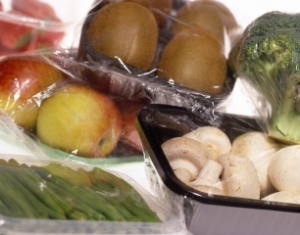
The grocery sector accounts for about 70% of the packaging market. About 4.9 million tonnes is household-related and if it isn't reused or recycled can end up in landfill.
Although many people think that packaging is the biggest fraction of household waste, recent figures show that households throw much more food and drink away than they do packaging.
Why we need packaging
Packaging is material used to protect, deliver or present goods. It also provides information about what's inside. Packaging is sometimes necessary for hygiene and can be required by law. It can also extend the life of items and helps prevent waste.
Just out of habit, many of us take fruit and vegetables out its pack as soon as we get it home. Keeping it in its original packaging can keep it fresher for longer. For example, shrink-wrapped cucumber will last around 5 times longer than non-shrink-wrapped ones.
Packaging labels can help you waste less food. Food labels are undergoing a lot of change due to new legislation. The aim is to make them less confusing and more helpful for customers. It's worth taking a closer look at the label, even for products you might buy regularly as the label may have changed recently.
Consumers are demanding that packaging should be minimised, made from a greater proportion of recycled content and that more of it should be easily recycled.
What's happening to reduce packaging?
The Packaging (Essential Requirements) Regulations 1998 were introduced to control packaging. A lot of work is put in to ensure these laws are applied and to make the people who make packaging pay for it to be recycled.
The Courtauld Commitment is a voluntary agreement between WRAP (Waste Resources Action Programme) and the UK grocery sector (including all major supermarkets and food and drinks manufacturers). The commitment began in 2005. A lot of good work is being done to reduce the weight and streamline packaging. This is helping to make sure that less waste ends up in your bin.
Choose products with less packaging
The products you choose to buy can have a big influence on the amount of waste produced. So look out for products with reduced packaging and avoid products which are over-packaged - this can make a really big difference in the long run. For example, buy loose fruit and veg - this can save a lot of otherwise unnecessary packaging.
Consider buying concentrates. Concentrated products contain less water so can reduce packaging by over 50%. Fabric conditioner, squash, liquid detergent and hand wash are all examples of concentrated or refillable products.